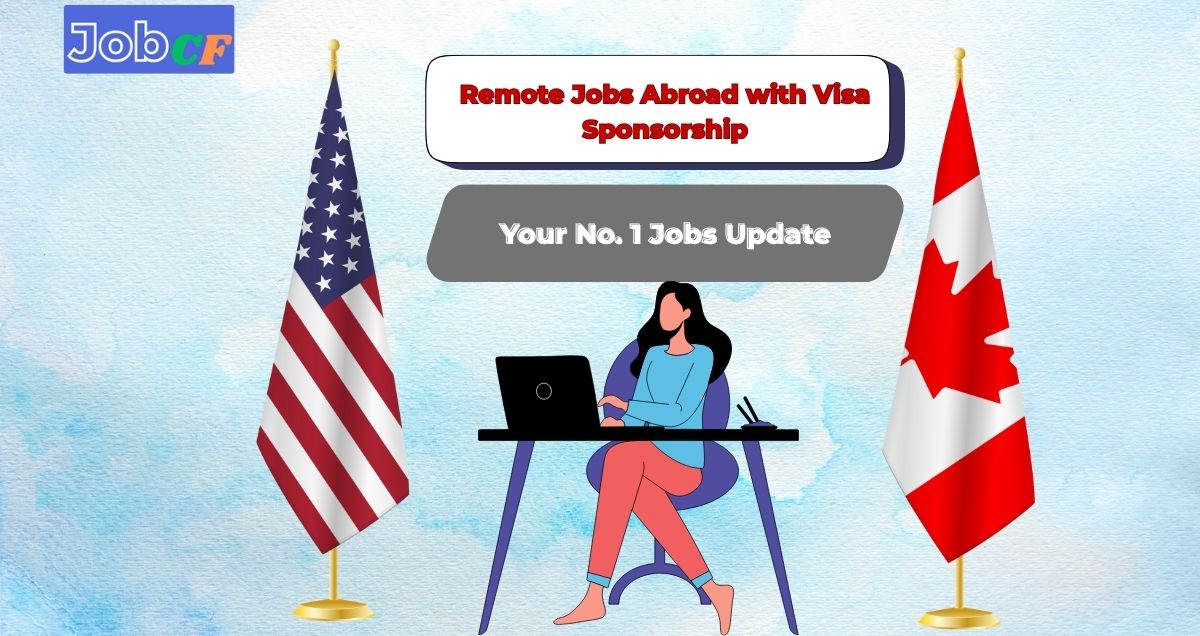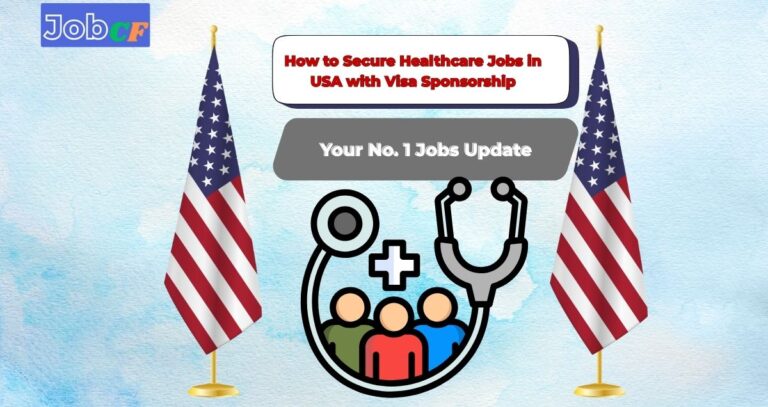
Working from another country isn’t just a fantasy anymore. With the rise of remote jobs abroad with visa sponsorship, professionals now have the chance to live overseas while earning a stable income from reputable companies. Whether you’re eyeing a co-working hub in Germany or a quiet seaside town in Portugal, there are now more options than ever before to build your career globally.
But landing international jobs with visa sponsorship can be tricky. Between legal requirements, employer expectations, and cultural shifts, many applicants give up before they start. The good news? You’re not alone—and you’re not without help.
This guide breaks down everything you need to know: which industries are hiring, how to find remote jobs with visa sponsorship, the best countries to consider, and real-life success stories to show it’s possible.
Remote Jobs Abroad with Visa Sponsorship Global Career Opportunities
What Are Remote Jobs with Visa Sponsorship?
Remote jobs with visa sponsorship are roles that allow you to work online from a different country, where the employer agrees to help you get the legal documents to stay there. These are not just “digital nomad” gigs—they’re full-time or part-time roles backed by official visa support.
Many companies offer this because they need global talent, especially in areas like tech, healthcare, and customer support. For example, GitLab hires developers worldwide and helps them secure visas if required. These are not one-off exceptions; large firms like Google and Microsoft also hire remote staff from different countries and offer visa support for key roles.
Whether you’re looking for freelance jobs with visa sponsorship or high-paying remote jobs with visa sponsorship in the tech industry, more options are opening up every year.
Why Pursue International Jobs with Visa Sponsorship?
Getting a job abroad with visa support isn’t just about travel. It’s about better pay, career growth, and cultural experience. People who work abroad with visa sponsorship often report higher job satisfaction and more professional development opportunities.
A 2024 LinkedIn study found that 68% of global professionals are open to moving abroad for the right remote role. The chance to work from anywhere, combined with legal support to stay in that country, is a strong motivator.
Whether you’re searching for entry-level remote jobs with visa sponsorship or more specialized roles in healthcare, finance, or education, these opportunities open doors to personal and professional growth that’s hard to find in a single-country job market.
Top Industries Offering Visa-Sponsored Remote Jobs
Remote Jobs with Visa Sponsorship in the Tech Industry
If there’s one sector leading the charge in visa sponsored remote jobs, it’s tech. Software development, cloud computing, UX/UI design, and data science roles are in high demand globally.
Companies like Automattic (makers of WordPress), Zapier, and GitHub hire developers and engineers remotely and assist with visa sponsorship if relocation is needed later. Many roles are fully remote, and some even allow you to work from anywhere while holding a work visa in a tech-friendly country like Germany or Canada.
For those with tech skills, these companies represent some of the best chances to find remote jobs with visa sponsorship requiring English, especially for non-US citizens.
Healthcare, Finance, and Education Sectors
It’s not just tech professionals who can benefit. Telemedicine doctors, remote financial advisors, and online educators are also in demand.
- In healthcare, remote jobs with visa sponsorship for telehealth doctors and medical consultants are growing due to staff shortages in countries like Japan and Australia.
- In finance, companies are hiring international analysts and accountants for remote roles. These often come with legal and tax support to stay compliant.
- Education is also booming. Many online schools and universities are hiring foreign tutors and curriculum designers with the promise of visa sponsorship.
For example, the global telemedicine market is expected to reach $459.8 billion by 2030, and many of these services hire internationally for remote consultation roles.
Whether you’re in nursing, finance, or teaching, these industries now offer a path for global professionals seeking visa sponsorship for remote work.
Customer Support and Freelance Opportunities
Many overseas jobs with visa sponsorship fall under customer support and freelancing. Companies like Zendesk and startups in Europe and Southeast Asia now hire international workers to handle customer queries remotely—and many offer visa support for top candidates.
Some platforms such as Toptal and Upwork Enterprise work with clients who are open to freelance jobs with visa sponsorship, especially when building long-term partnerships.
Even part-time remote jobs with visa sponsorship are now an option if you have niche skills and a strong portfolio.
Best Countries for Remote Jobs with Visa Sponsorship
Jobs in Japan with Visa Sponsorship
Japan is fast becoming a hotspot for remote workers. With a strong tech sector and high living standards, it’s a great destination for professionals looking for jobs in Japan with visa sponsorship.
The Highly Skilled Professional Visa makes it easier for remote tech and education workers to move and work legally. English speakers are in demand, and if you have tech or teaching experience, you could land a well-paying job with visa support.
Jobs in Germany with Visa Sponsorship
Germany offers one of the most structured visa programs for remote workers and skilled migrants. The EU Blue Card allows highly qualified professionals from non-EU countries to live and work in Germany with employer sponsorship.
Jobs in Germany with visa sponsorship span industries like tech, healthcare, and finance. Many of these roles start remote and later offer hybrid or in-country transitions with legal support.
Germany is also known for its strong labor protections and social benefits, making it a popular pick for expatriate jobs with visa sponsorship.
Other Top Destinations
Several other countries have rolled out dedicated remote work visa programs:
- Portugal’s D8 Visa supports remote workers and freelancers who work for foreign companies but want to live in Portugal.
- Canada and Australia have programs that support both remote work and employer-based sponsorships for key industries.
When considering the best countries for remote jobs with visa sponsorship, think about time zones, cost of living, and your profession’s demand in that country.
How to Find and Apply for Remote Jobs with Visa Sponsorship
Where to Find Visa-Sponsored Remote Jobs
Finding the right job that includes visa sponsorship can feel overwhelming, especially with so many listings that don’t clarify if sponsorship is available. Fortunately, a few reliable platforms specialize in international jobs with visa sponsorship:
- LinkedIn – Use filters like “work from anywhere” and keywords such as remote jobs with visa sponsorship or companies that offer visa sponsorship for remote jobs.
- We Work Remotely – Lists fully remote roles, including those with visa options.
- Remote.co and AngelList – Popular with startups and tech companies hiring global talent.
- Job boards by country – Such as Germany’s Make it in Germany or Japan’s JET Programme for educational roles.
Try setting alerts using terms like visa sponsored remote jobs, foreign jobs with visa sponsorship, or remote jobs abroad that sponsor visas so you get notified when relevant jobs are posted.
Requirements and Documents Needed
Every country and company has its own criteria, but common requirements for remote jobs with visa sponsorship include:
- A valid passport
- An updated CV/resume tailored to international standards
- A cover letter that addresses both your skill set and adaptability
- Proof of qualifications, such as degrees or certificates
- Work experience, often ranging from 1–5 years
- Language proficiency, usually in English
If you’re applying for remote jobs with visa sponsorship requiring English, make sure your application materials are well-written, clear, and error-free.
For remote roles in countries like Japan or Germany, employers may also ask for proof of funds or a clear police background check. These are standard for expatriate jobs with visa sponsorship to ensure compliance with immigration laws.
Visa Sponsorship Process for Remote Jobs
Once you get a job offer, the visa sponsorship process typically follows these steps:
- Employer submits sponsorship application to immigration or labor department.
- You’ll receive an invitation letter or employment contract to support your visa application.
- Prepare all documents needed for remote jobs with visa sponsorship, including educational records, passport copies, and proof of income.
- Attend a visa interview at the nearest embassy or consulate.
- If approved, you’ll get a temporary or long-term visa that allows you to work remotely in that country.
The timeline can take 3–6 months, depending on your home country and the employer’s location. During this time, stay in close contact with the company’s HR team to track progress.
Interview Tips for Success
Landing a role with visa support often comes down to how well you present yourself during the interview.
Here’s how to stand out:
- Show cultural awareness and readiness to work across time zones.
- Emphasize adaptability, especially if the job includes relocating later.
- Highlight soft skills like communication, self-discipline, and remote collaboration.
- Prepare for common questions like: “How do you manage productivity while working from home?” or “What makes you a strong fit for an international team?”
When preparing for interviews, tailor your responses to reflect why you’re the best fit for a remote work visa sponsorship program. If you’re targeting entry-level remote jobs with visa sponsorship, don’t forget to mention your eagerness to learn and grow within the company.
Top Companies Hiring Remote Workers with Visa Sponsorship
Global Tech Leaders
Some of the biggest names in tech are leading the way in offering remote jobs abroad that sponsor visas. These include:
- Amazon – Offers remote and hybrid roles with visa support for cloud engineers, analysts, and developers.
- Salesforce – Sponsors remote roles in AI, CRM, and business operations globally.
- Shopify – Hires software engineers and product managers from various countries, often with relocation or visa support if needed.
These firms often list remote jobs with visa sponsorship in tech industry and accept applications from non-US citizens, especially those with in-demand skills.
Emerging Players and Startups
Don’t ignore smaller companies and startups—they’re often more flexible and eager to attract international talent. Examples include:
- Zapier – Their 2024 report showed that 80% of their team works internationally. Many remote roles come with visa options.
- GitHub and Toptal – Known for hiring freelance and remote engineers across borders.
- Deel and Remote.com – These companies specialize in cross-border hiring and help other firms offer visa sponsorship for remote workers.
If you’re looking for freelance jobs with visa sponsorship or remote jobs with visa sponsorship no experience, these platforms can be a good starting point.
Challenges and Legal Aspects of Remote Jobs with Visa Sponsorship
Common Challenges
While working remotely abroad sounds appealing, it comes with a few challenges:
- Visa processing delays or denials due to incomplete documentation
- Cultural barriers and time zone mismatches that impact team collaboration
- Internet and tech limitations in some countries
- Navigating tax rules in two different countries
These hurdles can be addressed with proper planning. Many employers also provide relocation teams and legal advisors to help smooth the transition.
Being prepared helps overcome many of the challenges of remote jobs with visa sponsorship before they become serious issues.
Legal Considerations
It’s important to understand the legal side of working remotely in another country:
- You may need to register for local taxes even if your employer is overseas.
- Some countries require proof of ongoing income or local address for visa renewal.
- Depending on your location, labor laws may differ. Some countries require specific working hours or employment contracts in local languages.
Always consult with a visa expert or immigration lawyer if you’re unsure. Legal compliance builds trust with your employer and ensures a stress-free remote experience.
Our Success Stories
From the US to Japan: A Tech Journey
Isaac, a software engineer from Kenya, secured a remote backend role with a Tokyo-based tech startup. Within six months, the company sponsored his move through Japan’s Highly Skilled Professional Visa. He now works remotely while occasionally traveling to the head office. His journey shows how jobs in Japan with visa sponsorship are becoming more inclusive to global applicants.
A Digital Nomad in Portugal
Maria, a freelance marketer from Brazil, landed a role with a European startup through a global job board. With the help of Portugal’s Digital Nomad Visa, she moved to Lisbon and now enjoys a great balance of career growth and lifestyle perks. Her experience highlights how digital nomad jobs with visa sponsorship can change your life.
These success stories of remote jobs with visa sponsorship prove that anyone with skills, drive, and the right guidance can secure international opportunities.
Getting Started with Visa-Sponsored Remote Jobs
If you’re serious about working remotely abroad with visa sponsorship, here’s how to begin:
- Update your CV with international job standards.
- Join global platforms like LinkedIn and AngelList.
- Set keyword alerts such as remote jobs with visa sponsorship for non-US citizens or remote work visa sponsorship programs.
- Research visa rules for your target country.
- Apply smartly—tailor every application to the job and the company.
Also, join forums or online communities like expat groups or Reddit’s r/digitalnomad. These are great places to get leads and hear about companies hiring in real time.
Next Steps for Aspiring Global Workers
Don’t wait for the perfect opportunity to come to you—start applying now. Use trusted sites, reach out to recruiters, and consider entry-level remote jobs with visa sponsorship if you’re just starting out.
Your goal of working remotely abroad with visa sponsorship is possible, and thousands of others are already doing it.
Final Words
This guide has walked you through the entire path to securing visa sponsored remote jobs—from industries hiring to interview tips, legal steps, and global hotspots. Use it as your go-to resource, and don’t forget to check back for updates as more companies roll out global career opportunities with visa sponsorship.






